Juncos
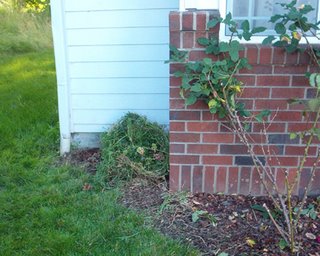
A mass of weeds was choking out a little bush in one corner, so I started pulling weeds energetically as "Friend Kitty" (a cat that often visits us) jumped up on a nearby wall and then wandered off.
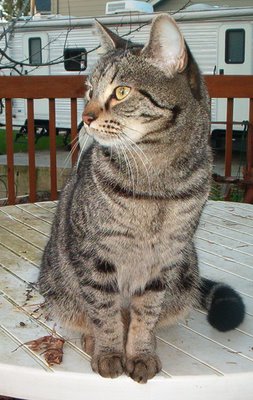
Then I saw it: back in the corner, on the ground, was a nest with four tiny baby birds in it. One of the parent birds had flown up as I came near. Now both of them were fluttering around my head, frantically saying "Chip! Chip!"
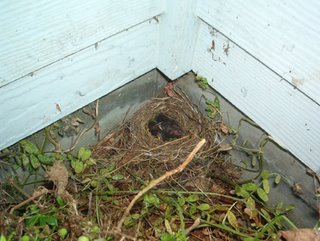
I called the girls excitedly to come see the baby birds. They were newly hatched; not more than two days old. Their little nearly-naked bodies huddled together to keep warm, and their eyes were still sealed shut.
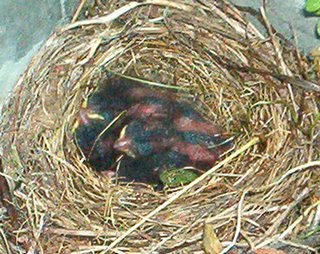
After we looked and took a few photos, I put back the weeds as well as I could. I tried to hide the nest, hoping the cat wouldn't find it.
A little research revealed that the birds were dark-eyed juncos, with the distinct hooding of the Oregon junco found throughout the West coast.
Early the next morning I went out to check on the baby birds just in time to catch the cat in the act of raiding the nest as the adult birds tried to drive it away. The cat had a bleeding gash in one hip, so the parent birds must have been defending the nest valiantly.
###########
I chased the cat away and picked up the baby juncos scattered on the ground. Amazingly, all four were still alive. They had grown a bit and gotten fuzzier even since the day before.
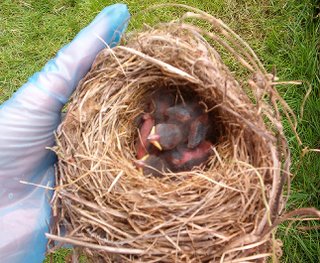
I knew I couldn't leave them on the ground now that the cat knew where they were, so I put the nest into a little box and had the girls take turns guarding it while I tried to rig something up. I thought maybe I could just block off that corner so the cat couldn't get in, but I'd seen the cat jump up on the windowsill nearby and over the back fence, so I knew it could probably get over anything I set up. The wooden birdfeeder I thought might work turned out to be too small.
Meanwhile, I knew the baby birds had to be hungry, and were probably in shock. One was bleeding a bit. The cat and the parent birds were all hovering around, watching my every move.
Eventually the girls and I took the nest with us to ask our friends across the street if they happened to have a birdhouse. Happily, they did--a bluebird house with a hinged front.
Baby juncos are used to being fed every half-hour or so, and by this time it had been hours since the parent birds had fed them. I put the birdhouse with the nest in it on the ground and sat some distance away until I saw the parent birds going in and feeding the babies. I left them alone for a while so they could get used to the nest box and feed the babies, but I knew if I left them on the ground the cat would get to them.
I was a little worried about whether the birds would be able to handle it if I moved the nest above where it had been, since juncos usually nest and forage on the ground. So I called the local rescue chapter of the Audobon society, which said that the birds would probably do all right with it as long as I didn't move it too high or too far away from the existing location.
After getting a ladder from the garage,I nailed the birdhouse to the side of the house, directly above where the nest had been. I left the door open so the parents would be able to find the nest easily.
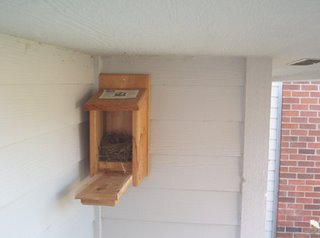
As I took a few pictures before putting the nest into the birdhouse, I noticed that one of the babies had been in the same position for a long time, with one wing hanging awkwardly over the side of the nest.
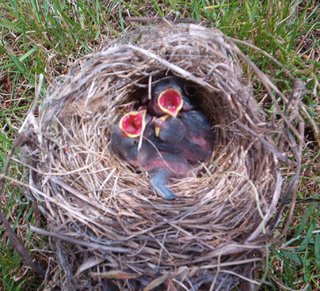
It was the chick that the cat had dragged farthest from the nest; the wounded one. It was dead. I didn't know what to do with it, so I took it out of the nest and left it on the wall nearby. It was so tiny, with its pinfeathers just starting to come in and its tummy still showing the hatchling bulge.
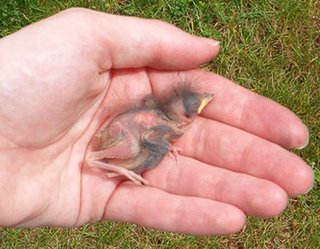
I left the other three babies in nest, and put it into the birhouse, then backed off. But the parent birds couldn't seem to find the nest.
I went into the house for a while, but every time I came out they were hopping around the dead chick on the wall, trying to feed it, and ignoring the other babies in the nest. Even after I watched for a long time they didn't seem to see the nest.
Since one chick had already died, I was getting worried about the other three chicks. When I checked on them, they seemed to be weakening. One in particular was quickly losing strength. If the parents didn't start caring for them soon they wouldn't last long.
I moved the dead baby to the top of the ladder a few feet under the birdhouse, but it didn't seem to help.
I'd hand-fed baby birds before, so I knew it was possible--but a lot of work. The thought of trying to feed baby birds every half-hour in addition to nursing a baby and fixing meals for preschoolers didn't seem manageable at all.
Still, if I could feed them something it might help them hold out until the parents found the nest.
I found a recipe for emergency baby bird food and mixed up a batch on my stovetop. Since juncoes are seed-eaters, I used mostly baby cereal (oatmeal and brown rice) mixed with water, a slice of mashed banana, and an egg yolk, cooked together into a mush. I took a little of this mixture outside in a cup, and when it had cooled I fed them some on the blunt end of a wooden toothpick. They seemed to like it, chirping excitedly and then gobbling the food as fast as I could put it into their little mouths.
The parent birds heard the tiny cheeping noises (barely audible even to someone standing right next to the nest) and became excited. By the time the baby birds seemed satisfied, the parents were flying past my head and flitting onto the roof next to me, chirping excitedly. When I got down and took the ladder away, the parents flew to the nest within minutes.
The girls and I scattered birdseed around the yard, and the parents happily cared for their brood. I didn't want to upset them further, so I made sure we kept a distance from the nest.
Several days later, I couldn't stand it any longer. I had to see if the baby birds were okay. I'd been watching and listening and hadn't heard anything from the nest, and the parent birds didn't seem to be hovering close by any more. I was afraid the chicks had died.
When I climbed up the ladder, three fledglings fluttered almost into my face and into the trees nearby. They already had all their feathers and were flying quite well. They slept in the nest for another night or two, then were off on their own. Baby birds sure grow up fast!
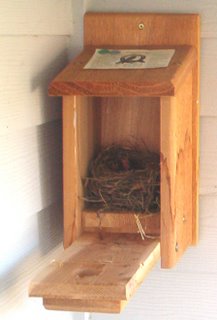
Juncos usually raise two broods per year, so I hope the pair of juncos will lay their eggs in the birdhouse again. It's certainly a safer place than on the ground where the cat can get them.












